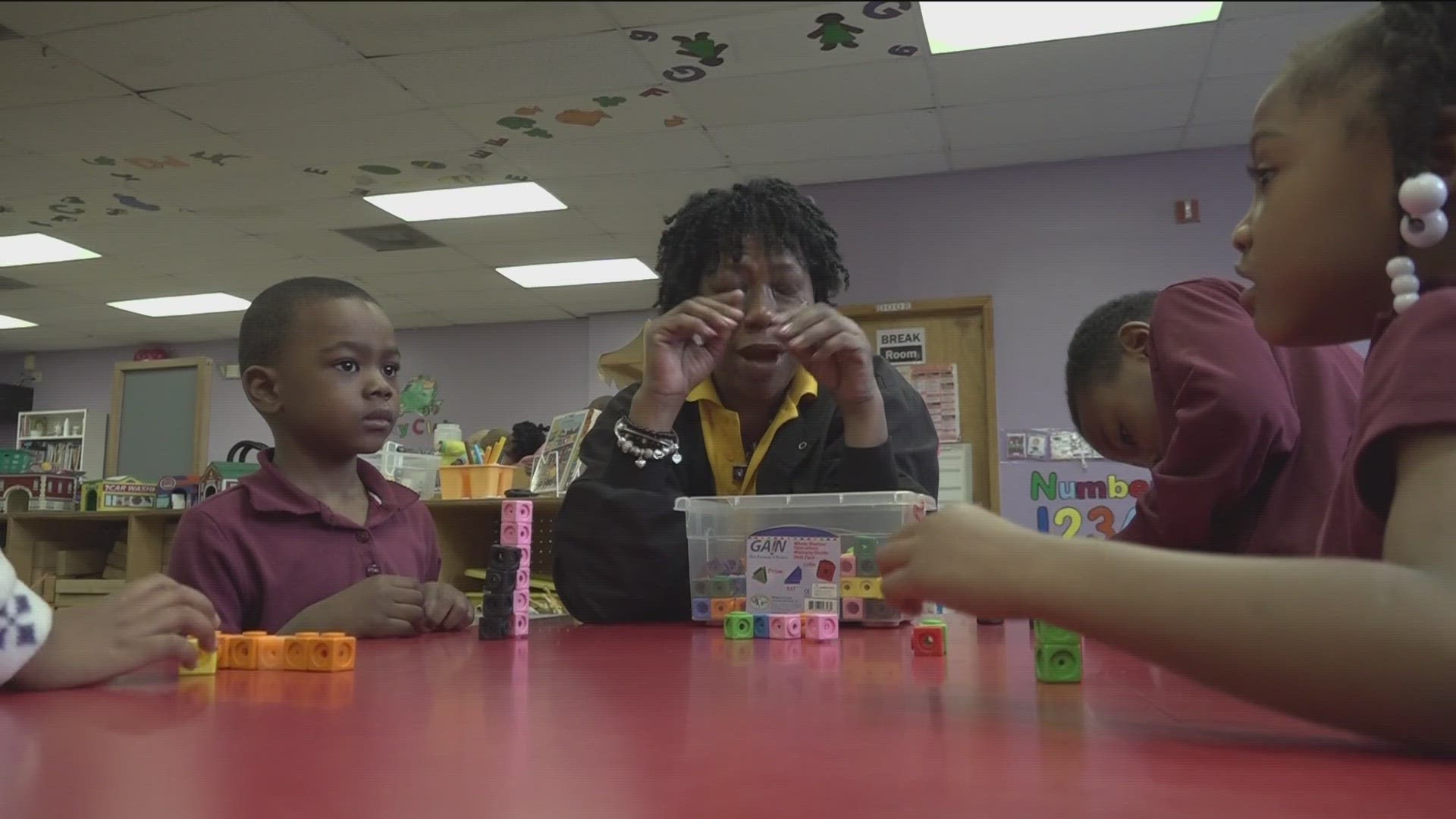ATLANTA — The pre-K lottery is currently underway in several metro Atlanta counties, with parents soon learning whether there will be a spot for their four-year-old in Georgia’s pre-kindergarten program.
This year’s lottery also comes as lawmakers push to expand access and get more children off the waitlist and in the classroom.
Stephan Northern of Angel’s Paradise Higher Learning Academy witnesses the advantages pre-K offers students in their early, formative years.
"This is the age where all your children soak up everything, anything they come across, they’re soaking it up,” Northern shared. “I know some parents tend to send their children just into kindergarten, but, in my opinion, it's very important to start in pre-K because you want them to have that foundation to prepare them for elementary school.”
But helping kids make that seamless transition can present financial struggles, Northern shared, amid rising costs and gaps in state-funded pre-K salaries versus K-12 and other industries. State lawmakers agree, and proposals are on the table to tackle such challenges this session.
"An assistant teacher today earns $20,000," House Speaker Pro Temp Jan Jones shared earlier this year. "She or he would make more working full time at Target."
Jones, who led a working group on early childhood education, was joined by Speaker Jon Burns at a January press conference, unveiling a funding proposal aiming to increase salaries and expand pre-K access. 72,000 children are currently enrolled in Georgia’s pre-K program, according to state officials, which is free for interested families and funded through the lottery. Yet, 3,300 children remain on waitlists.
To bolster the program, House Leadership hopes to make salaries more comparable to that of K-12 teachers. In his budget proposal, Governor Brian Kemp also included increases for pre-K teacher pay. The gaps, the Georgia Department of Early Care and Learning confirmed, remain significant. They noted assistant pre-K teacher pay starts at $21,000, with lead teachers starting around $43,000. As a result, teachers not only can make more in alternate industries, but the overall teacher shortage leaves prekindergarten in a state of turnover.
“We see that when they're losing teachers in K-12, we're seeing our pre-K teachers, you know, move up and take those slots,” Susan Adams, Deputy Commissioner with DECAL, explained.
But it’s not only pay that’s at stake. Burns and Jones also want to invest more in Pre-K startup and operation costs. Adams said more funding in those areas could indeed encourage more public school systems or providers to offer pre-K classes in areas that currently have waitlists. Half the classes statewide are provided by districts while child care centers operate the other half, Adams said.
“We need to be able to provide a package,” Adams shared, “A grant that entices people to participate in the program, especially at that time when people are having to make tough choices with limited funds.”
Northern agreed that the balancing act between resources and the high cost of quality services can be tricky.
“You can run out of money just on paper, pencils, markers and glue sticks,” he said. “Which happens.
Under Burns’ and Jones’ proposal, classroom startup costs would increase from $8,000 to $30,000. Polly McKinney, Advocacy Director with Voices for Georgia’s Children, is encouraged by the ideas put forth.
“We’re excited that the House wants to add funds to do that,” McKinney said. “We're excited about the increases in teacher pay because our pre-K teachers and assistant teachers all need to be able to support their own families so that they can give the kids in the classroom the best that they've got.”
On Thursday, Governor Kemp will sign the midyear budget, which extends funding through June 30 and includes nearly $9 million for DECAL’s Summer Transition Program. The program, which aims to close the achievement gap for children ahead of kindergarten, was previously expanded thanks to federal COVID funding, and the funding will allow the continued expansion of those services supporting more than 4,600 students.
Going forward, the General Assembly still must pass the budget for the upcoming fiscal year. Jones confirmed that conversations are ongoing with the governor when it comes to teacher pay and other pre-K funding.
“I am very appreciative the Summer Transition Program will continue to offer to school to four-year-olds entering kindergarten that did not attend Pre-K,” Speaker Pro Temp Jan Jones said in a statement. “House Leadership continues to have productive discussions with Governor Kemp's office to implement needed reforms and increases in Pre-K funding. I am optimistic we will expand access and quality in Pre-K to serve Georgia's youngest students.”
A spokesperson for Governor Kemp told 11Alive there are no updates to share on the 2025 fiscal year budget at this time, “but the Governor is proud of his proposals to invest in higher pay for certified teachers and teacher assistants and reduced class sizes.”

